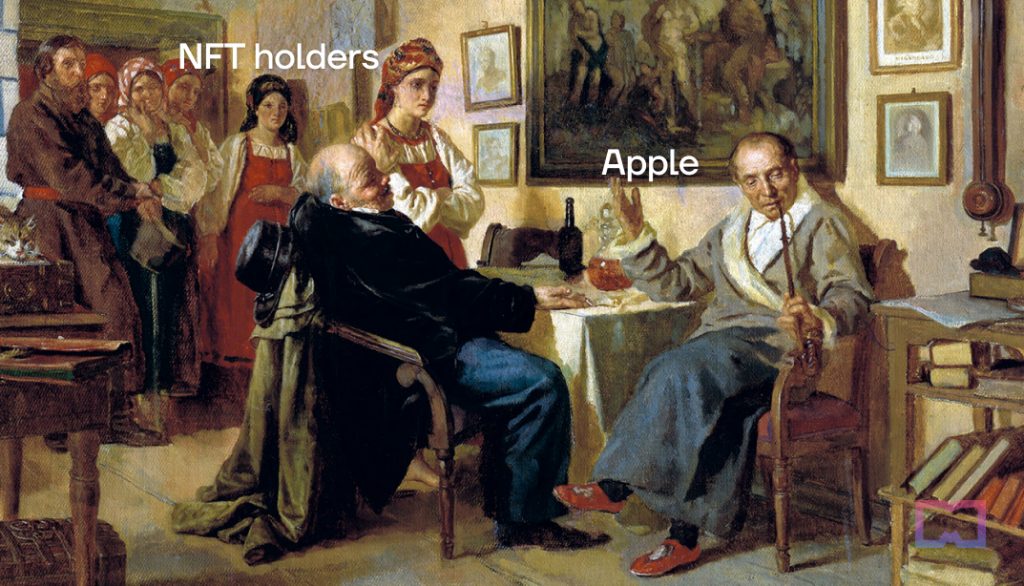Apple changes the App Store terms and bans NFTs that unlock features

In Brief
Apple’s new guidelines prohibit platforms that offer NFT unlockables.
The company looks to limit competition and control payment inflow in the App Store.

Apple revealed the latest updates to its App Store Review Guidelines and Terms on Monday. The new language revolves around NFTs—while they are still allowed within other apps on Apple’s App Store, they can’t unlock new features or content.
Why is the California-based firm limiting NFT unlockables within its App Store? The answer goes back to the App Store’s business model. Apple prefers to collect payments from clients through in-app purchases.
In many NFT projects, token ownership brings different types of content and rewards, such as merchandise, games, and various perks. Apple’s decision, which says no to property rights, might discourage users from purchasing NFTs. Future clients might even think twice before buying an Apple product or downloading apps through the App Store.
“Apps may allow users to view their own NFTs, provided that NFT ownership does not unlock features or functionality within the app,”
the guidelines stated.
Moreover, developers won’t be able to include “buttons, external links, or other call actions” that could lead to users buying NFTs through another external channel or platform. Any violation of this policy is a breach of the guidelines and can result in removal or rejection from the App Store.
In September, Apple announced a 30% cut from all NFTs sold in apps offered through the App Store. Even though 30% seems overpriced, it makes sense that the company is trying to promote in-app purchases from the App Store.
Apart from NFTs, Apple restructured its language surrounding crypto exchanges listed on the App Store. Only approved exchanges can allow crypto transfers. In this case, NFTs aren’t considered cryptocurrency assets.
These new guidelines show how Apple wants to keep control of the income in the ecosystem, although it’s cooperating with crypto apps on its own terms. Any platform competing with Apple for primary or secondary NFT purchases will be limited.
Regarding the metaverse and VR technology, Apple disclosed in June the release of a VR/AR headset for 2023. The company is ready to enter the metaverse and VR space and compete against Zuckerberg’s Meta.
Read related posts:
Disclaimer
In line with the Trust Project guidelines, please note that the information provided on this page is not intended to be and should not be interpreted as legal, tax, investment, financial, or any other form of advice. It is important to only invest what you can afford to lose and to seek independent financial advice if you have any doubts. For further information, we suggest referring to the terms and conditions as well as the help and support pages provided by the issuer or advertiser. MetaversePost is committed to accurate, unbiased reporting, but market conditions are subject to change without notice.
About The Author
Agne is a journalist who covers the latest trends and developments in the metaverse, AI, and Web3 industries for the Metaverse Post. Her passion for storytelling has led her to conduct numerous interviews with experts in these fields, always seeking to uncover exciting and engaging stories. Agne holds a Bachelor’s degree in literature and has an extensive background in writing about a wide range of topics including travel, art, and culture. She has also volunteered as an editor for the animal rights organization, where she helped raise awareness about animal welfare issues. Contact her on [email protected].
More articles

Agne is a journalist who covers the latest trends and developments in the metaverse, AI, and Web3 industries for the Metaverse Post. Her passion for storytelling has led her to conduct numerous interviews with experts in these fields, always seeking to uncover exciting and engaging stories. Agne holds a Bachelor’s degree in literature and has an extensive background in writing about a wide range of topics including travel, art, and culture. She has also volunteered as an editor for the animal rights organization, where she helped raise awareness about animal welfare issues. Contact her on [email protected].












